Fox News Flash top headlines for March 10
Fox News Flash top headlines are here. Check out what's clicking on Foxnews.com.
North Korea tested a new intercontinental ballistic missile system in two launches Feb. 26 and March 4, a senior Biden administration official said Thursday, calling it a "serious escalation."
The system was originally unveiled during the Korean Workers Party parade Oct. 10, 2020, and again in the Defense Exhibition in Chung Young in October 2021, the official said Thursday. The 2022 launches did not demonstrate ICBM range or capability but were likely aimed at testing elements of the new system, the official said
The senior administration official predicted a future launch at "full range," which may be disguised as a space launch.
BIDEN ADMIN CONDEMNS NORTH KOREA MISSILE LAUNCH, SEEKS 'SERIOUS AND SUSTAINED DIPLOMACY' WITH DPRK
"The United States strongly condemns the DPRK for these tests," the official said. "These launches are a brazen violation of multiple United Nations Security Council resolutions, aimlessly raise tensions and risk destabilizing the security situation in the region."
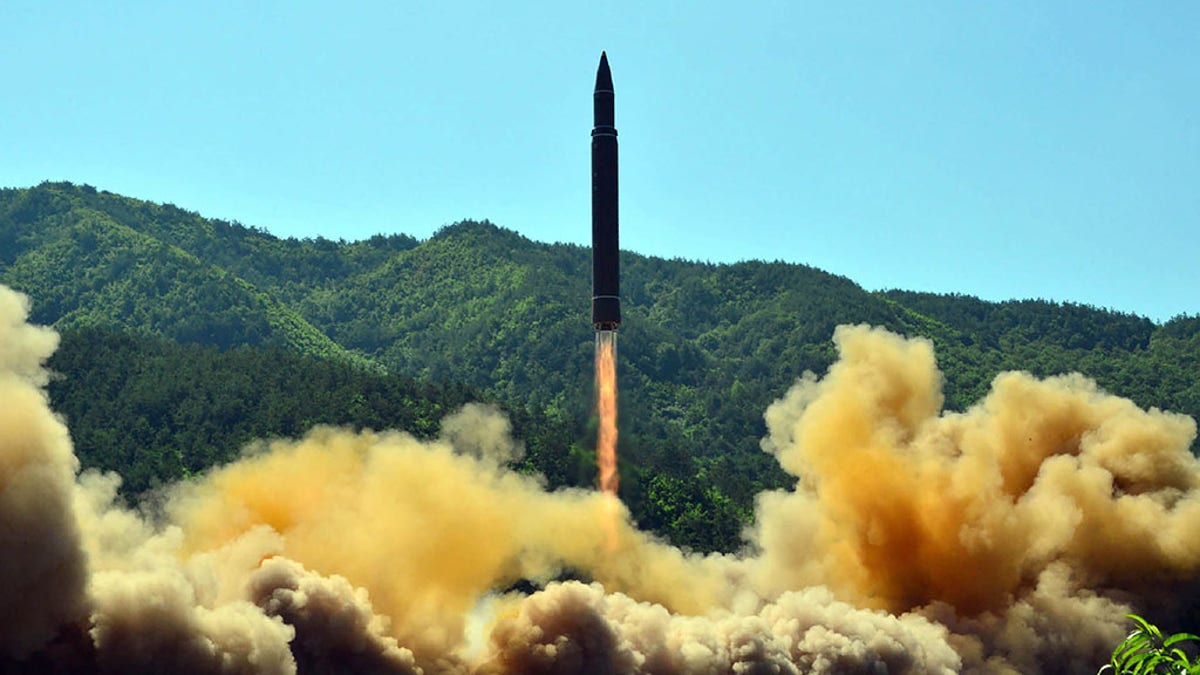
This picture taken July 4, 2017, and released by North Korea's official Korean Central News Agency (KCNA) July 5, 2017, shows the successful test-fire of the intercontinental ballistic missile Hwasong-14 at an undisclosed location. (STR/AFP via Getty Images)
The official said that unlike North Korean leader Kim Jong Un’s past tests, his country "tried to hide these escalatory steps."
The Biden administration, though, is continuing to seek a diplomatic solution toward its goal of denuclearizing the Korean Peninsula, and the official said Thursday the administration is "prepared to meet without preconditions."
"President Biden himself has previously made clear that he is open to meeting with Kim Jong Un when there is a serious agreement on the table," the official noted.
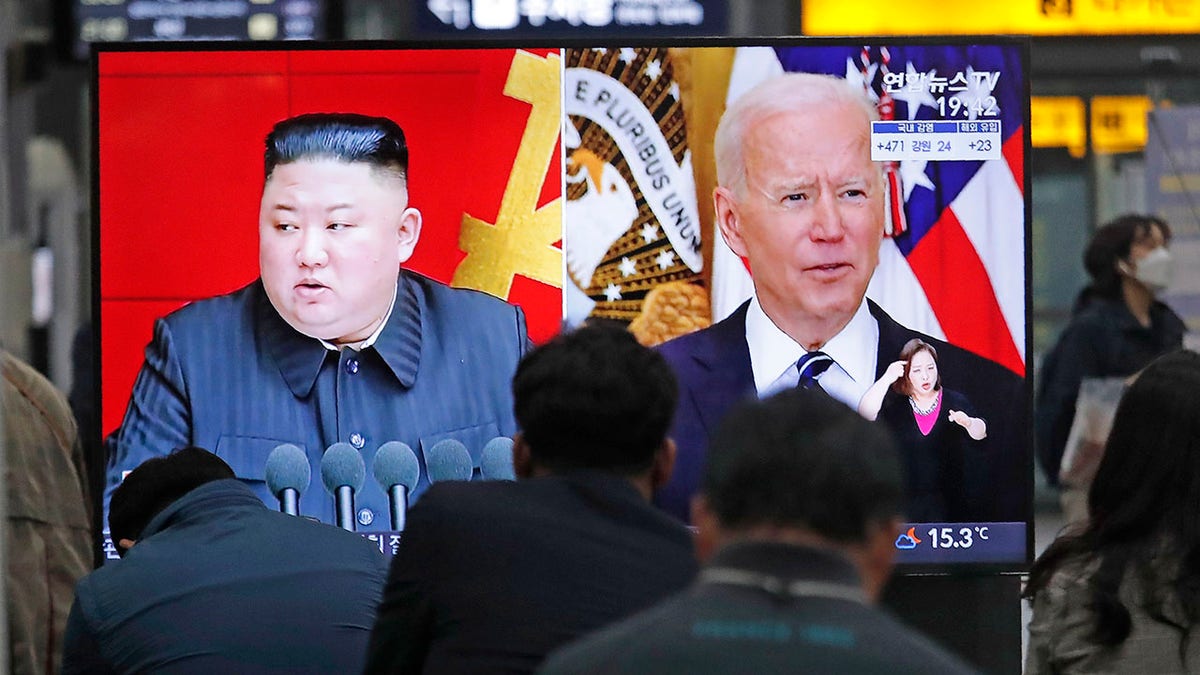
Commuters watch a TV showing a file image of North Korean leader Kim Jong Un and U.S. President Biden during a news program at the Suseo Railway Station in Seoul, South Korea, March 26, 2021. (AP Photo/Ahn Young-joon)
Former President Trump held a historic summit with Kim Jong Un in June 2018.
NORTH KOREA TESTS MORE MISSILES IN JANUARY THAN ALL OF 2021, INCLUDING MOST POWERFUL ONE IN YEARS
This week, the U.S. Indo-Pacific Command ordered "intensified" intelligence surveillance and reconnaissance in the Yellow Sea, the official said. The U.S. Indo-Pacific Command also added "enhanced readiness among our ballistic missile defense forces in the region."
And on Friday, the Treasury Department is expected to announce new actions to prevent North Korea from accessing "foreign items and technologies that enable it to advance prohibited weapons programs," the official said, adding that there will be "a range of further actions in the coming days."
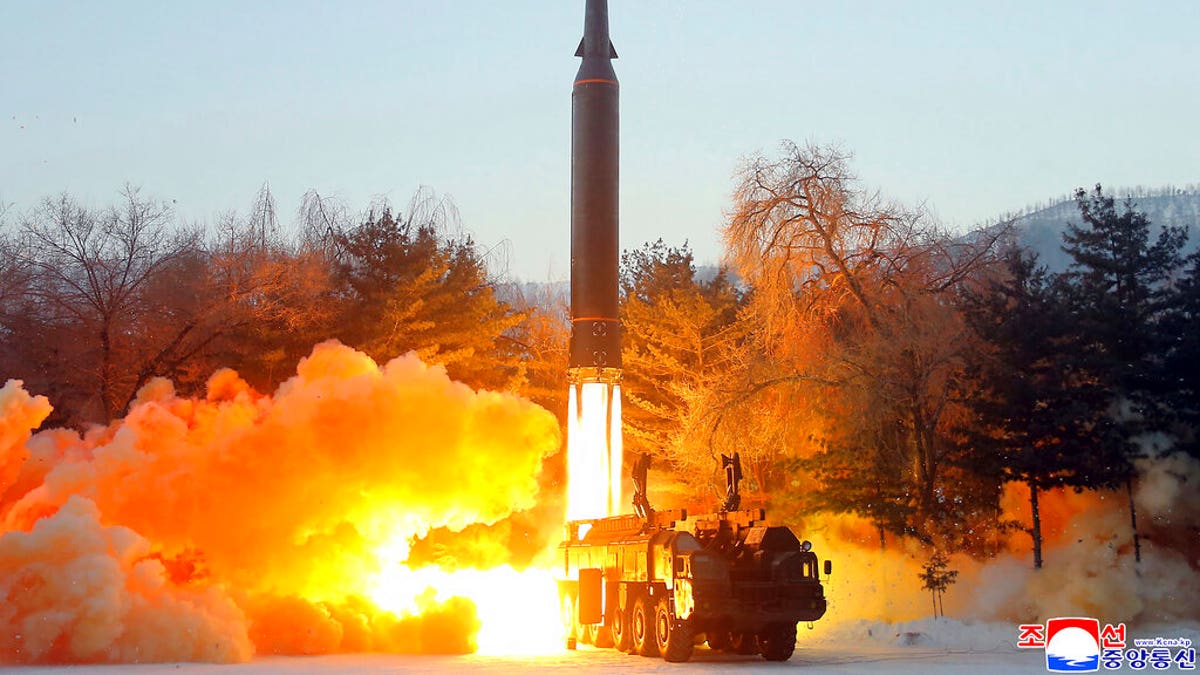
This photo provided by the North Korean government shows what it says is a test launch of a hypersonic missile in North Korea Jan. 5, 2022. (Korean Central News Agency/Korea News Service via AP)
North Korea in January fired what appeared to be its most powerful missile since President Biden took office, a move senior U.S. officials described at the time as concerning and "increasingly destabilizing."
The Japanese and South Korean militaries said the January missile was launched on a high trajectory, apparently to avoid the territorial spaces of neighbors, reached a maximum altitude of 1,242 miles and traveled 497 miles before landing in the sea.
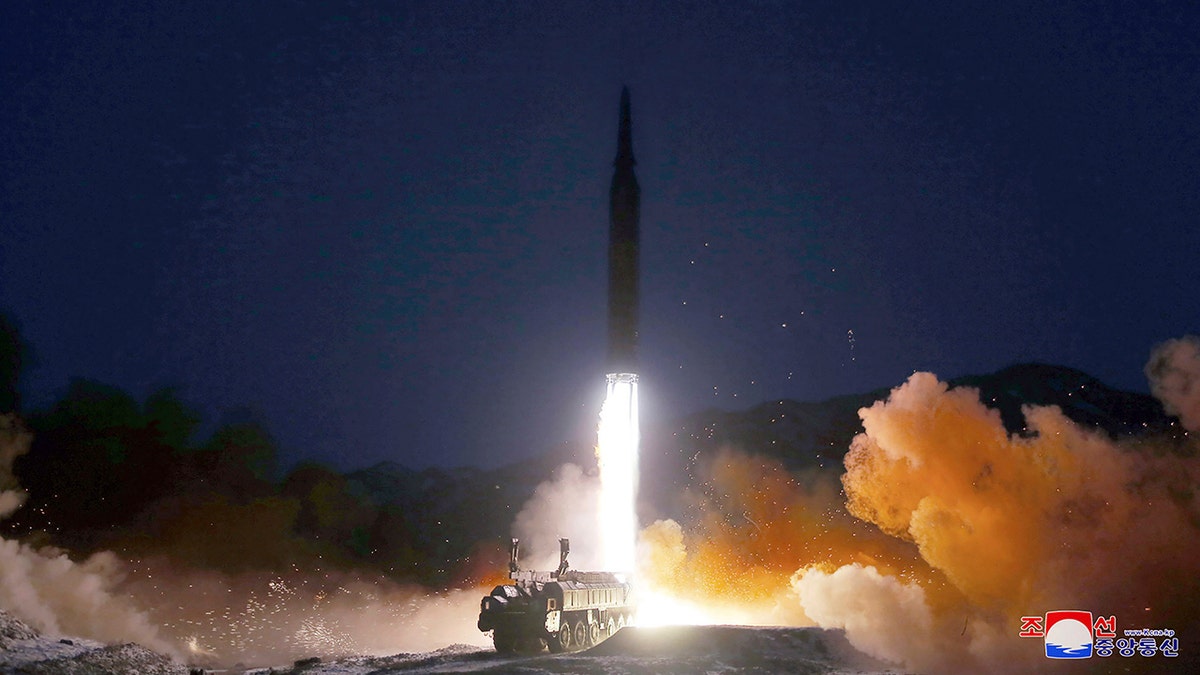
This photo provided by the North Korean government shows what it says is a test launch of a hypersonic missile Jan. 11, 2022, in North Korea. (Korean Central News Agency/Korea News Service via AP)
The flight details suggested North Korea tested its longest-range ballistic missile since 2017, when it flew ICBMs that demonstrated the potential to reach the U.S.
North Korea completed more missile tests in January than it did in all of 2021, alarming South Korean officials who worry about its northern neighbor's intentions.
North Korea in January attempted to justify its testing activity as an exercise of its right to self-defense. It has threatened stronger action after the Biden administration imposed fresh sanctions following two tests of a purported hypersonic missile in early January.
In its 2022 annual threat assessment, the U.S. intelligence community warned of North Korea’s "continued development of ICBMs" and its commitment to expanding the country’s nuclear weapons arsenal, as well as continuing ballistic missile research and development.
North Korea’s actions in January appeared to be moves in "laying the groundwork for an increase in tensions that could include ICBM or possibly a nuclear test this year — actions that Pyongyang has not taken since 2017," the intelligence community wrote.
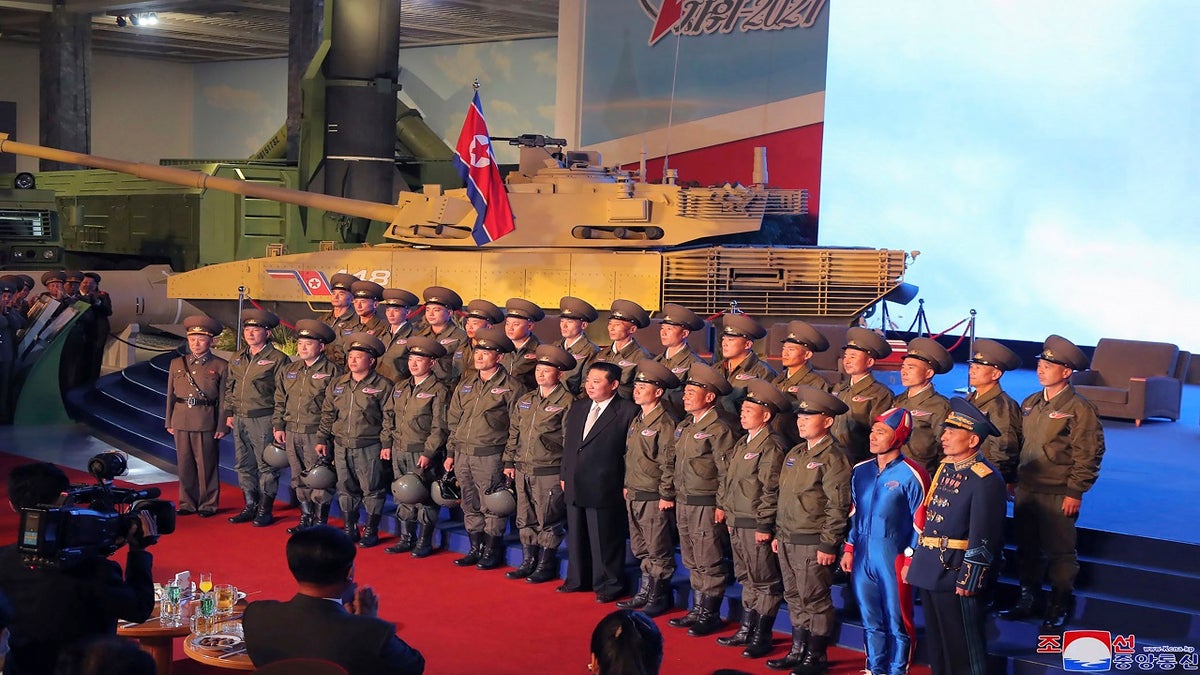
North Korean leader Kim Jong Un, center, poses for a group photo with fighter pilots who made the demonstration flight at the opening of an exhibition of weapons systems in Pyongyang, North Korea, Monday. (Korean Central News Agency/Korea News Service via AP)
"Flight tests are part of North Korea’s effort to expand the number and type of missile systems capable of delivering nuclear warheads to the entire United States," according to the assessment. "North Korea continues to seek a sea-based nuclear-strike capability."
CLICK HERE TO GET THE FOX NEWS APP
The intelligence community also warned that North Korea’s "chemical and biological weapons (CBW) capabilities remain a threat" and said U.S. intelligence officials are "concerned that Pyongyang may use such weapons during a conflict or in an unconventional or clandestine attack."
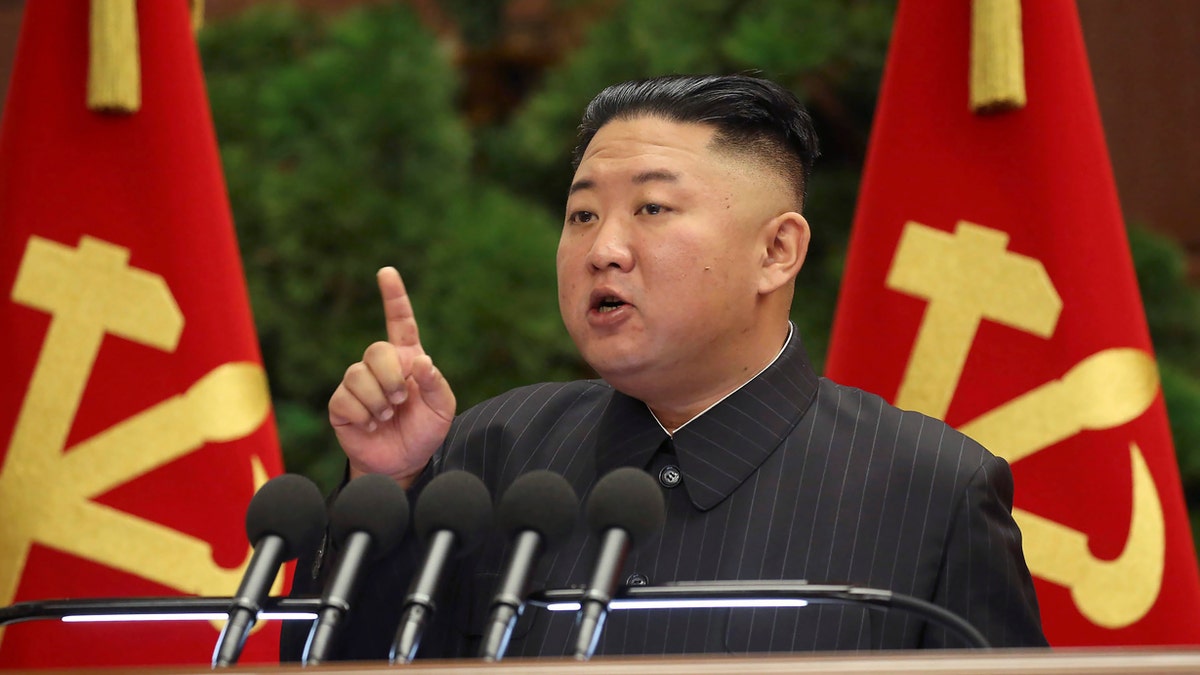
In this June 29 photo provided by the North Korean government, North Korean leader Kim Jong Un speaks during a Politburo meeting of the ruling Workers' Party in Pyongyang, North Korea. (AP/Korean Central News Agency/Korea News Service)
The intelligence community found that Kim "views nuclear weapons and ICBMs as the ultimate guarantor of his totalitarian and autocratic rule of North Korea and believes that, over time, he will gain international acceptance as a nuclear power."
CLICK HERE TO GET THE FOX NEWS APP
"He probably does not view the current level of pressure on his regime, the economic hardships resulting from sanctions and his domestic COVID-19 countermeasures as enough to require a fundamental change in approach," the intelligence community warned, adding that Kim "aims to achieve prestige as a nuclear power as well as strategic dominance over South Korea."






